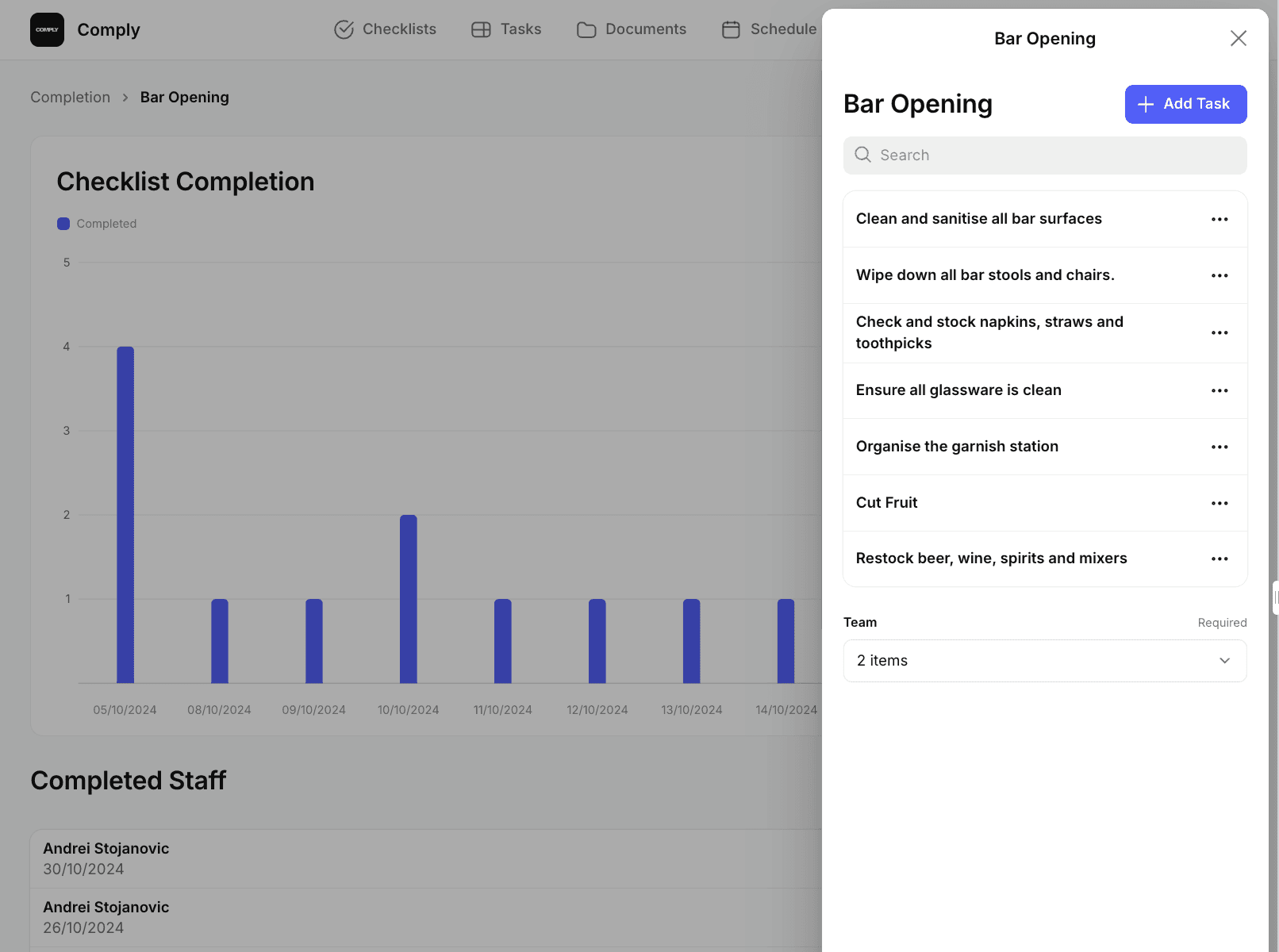The Importance of Hospitality Certifications
Aug 30, 2024

In the competitive hospitality industry, standing out from the crowd requires more than just experience and enthusiasm. Hospitality certifications offer a way to validate your skills, knowledge, and commitment to excellence. Whether you’re a seasoned professional looking to advance your career or a business aiming to enhance your team’s expertise, earning a recognised certification can provide significant advantages. This blog explores the importance of hospitality certifications, the benefits they offer, and how they can contribute to both personal career growth and overall business success.
Why Hospitality Certifications Matter
1. Enhancing Professional Credibility
Hospitality certifications are a mark of professionalism and expertise. They demonstrate to employers, colleagues, and customers that you have met industry standards and possess the skills necessary to excel in your role.
Industry Recognition: Certifications from recognised institutions, such as the Australian Institute of Management (AIM) or the International Air Transport Association (IATA), are widely respected in the hospitality industry. They signal to employers that you are knowledgeable, competent, and committed to your profession.
Customer Trust: For customer-facing roles, certifications can enhance customer confidence. Guests are more likely to trust and value the service provided by certified professionals, knowing that they have been trained to meet high standards.
2. Career Advancement
Earning a hospitality certification can open doors to new career opportunities, whether you’re seeking a promotion, a new role, or a shift into a specialised area of the industry.
Competitive Edge: In a competitive job market, certifications can give you an edge over other candidates. They show potential employers that you have taken the initiative to further your education and skills, making you a more attractive candidate for higher-level positions.
Pathway to Specialisation: Certifications allow you to specialise in areas such as event management, food and beverage operations, or hotel management. Specialising in a particular field can lead to new career paths and opportunities for advancement within your chosen area.
3. Improving Business Operations
For businesses, having a team of certified professionals can lead to improved operations, higher standards of service, and increased customer satisfaction.
Enhanced Skill Set: Certifications provide employees with advanced skills and knowledge that can be directly applied to their roles. This leads to better decision-making, more efficient operations, and higher quality service.
Consistency and Standardisation: When employees are certified, businesses can ensure that they are all trained to the same standards. This consistency helps maintain high levels of service across all departments and locations.
4. Staying Current with Industry Trends
The hospitality industry is constantly evolving, with new trends, technologies, and regulations emerging regularly. Certifications help professionals stay up-to-date with the latest developments and best practices.
Ongoing Education: Many certification programs require continuing education to maintain credentials. This encourages professionals to stay informed about industry changes and continually improve their skills.
Adapting to Change: Staying current with industry trends allows professionals to adapt to changes more effectively, whether it’s implementing new technologies, complying with updated regulations, or meeting shifting customer expectations.
Popular Hospitality Certifications
1. Certified Hospitality Supervisor (CHS)
The Certified Hospitality Supervisor (CHS) certification is designed for individuals in supervisory roles within the hospitality industry. This certification focuses on leadership, communication, and operational management skills.
Key Areas Covered: The CHS certification covers topics such as team leadership, employee training, conflict resolution, and performance management. It’s ideal for those looking to enhance their supervisory skills and advance into higher management roles.
Career Impact: Earning a CHS certification can lead to opportunities for promotions to roles such as department head, operations manager, or general manager.
2. Certified Hotel Administrator (CHA)
The Certified Hotel Administrator (CHA) certification is one of the most prestigious credentials in the hospitality industry, designed for experienced hotel managers and executives.
Key Areas Covered: The CHA certification covers a wide range of topics, including financial management, marketing, human resources, and property operations. It’s intended for professionals who are responsible for the overall management of a hotel or hospitality property.
Career Impact: Holding a CHA certification can enhance your credibility and open doors to executive-level positions within the hospitality industry, such as hotel general manager or regional director.
3. Certified Meeting Professional (CMP)
The Certified Meeting Professional (CMP) certification is designed for professionals in the event planning and management sector of the hospitality industry.
Key Areas Covered: The CMP certification focuses on meeting and event design, site management, risk management, and marketing. It’s ideal for event planners, coordinators, and managers looking to advance their careers.
Career Impact: Earning a CMP certification can lead to higher-level roles in event management, such as event director or conference manager, and is recognised globally as a mark of excellence in the field.
4. Food Safety Supervisor (FSS)
The Food Safety Supervisor (FSS) certification is essential for professionals responsible for overseeing food safety in the hospitality industry.
Key Areas Covered: The FSS certification covers topics such as food hygiene, storage and handling, foodborne illnesses, and compliance with food safety regulations. It’s required by law in many regions for businesses that serve food.
Career Impact: Holding an FSS certification is crucial for roles such as kitchen manager, food and beverage director, or restaurant manager. It ensures that your establishment meets legal requirements and maintains high standards of food safety.
5. Certified Guest Service Professional (CGSP)
The Certified Guest Service Professional (CGSP) certification is focused on delivering exceptional customer service in the hospitality industry.
Key Areas Covered: The CGSP certification covers topics such as guest communication, problem-solving, service excellence, and handling guest complaints. It’s ideal for front-line staff and those in customer-facing roles.
Career Impact: Earning a CGSP certification can enhance your customer service skills, leading to roles such as guest relations manager or front office manager. It’s a valuable credential for anyone looking to improve their service delivery.
How to Choose the Right Hospitality Certification
1. Assess Your Career Goals
Before selecting a certification, it’s important to consider your career goals and how the certification aligns with them.
Identify Your Interests: Consider which areas of the hospitality industry you are most passionate about. If you enjoy working directly with guests, a certification in guest service might be the best fit. If you’re aiming for a management role, a broader certification like the CHA might be more appropriate.
Long-Term Aspirations: Think about where you see yourself in the future. If you’re aspiring to move into an executive role, choose a certification that provides the skills and credentials needed for that level of responsibility.
2. Research Certification Requirements
Each certification has its own set of requirements, including eligibility criteria, coursework, and exams. Make sure you understand what is required before committing to a program.
Eligibility Criteria: Some certifications may require a certain level of experience or prior education in the hospitality industry. Ensure that you meet these requirements before applying.
Coursework and Exams: Review the coursework and exam structure to understand what is involved. Some certifications may require in-person exams, while others can be completed entirely online.
3. Consider Accreditation and Recognition
It’s important to choose a certification that is accredited and recognised by industry bodies and employers.
Check Accreditation: Ensure that the certification is accredited by a reputable organisation, such as the American Hotel & Lodging Educational Institute (AHLEI) or the Australian Institute of Management (AIM). Accreditation ensures that the certification meets industry standards and is respected by employers.
Employer Recognition: Verify that the certification is recognised by employers in your region and within your specific field of interest. This is crucial for ensuring that the credential will be valuable in your career progression.
4. Evaluate the Cost and Time Commitment
Consider the cost of the certification program and the time required to complete it.
Cost of Certification: Certifications can vary in cost, so it’s important to choose one that fits your budget. Some employers may offer financial support or reimburse the cost of certification, so check if this is an option.
Time Commitment: Consider how much time you can realistically dedicate to completing the certification. Some programs may require several months of study, while others can be completed in a shorter time frame.
Conclusion
Hospitality certifications are a valuable investment for both individuals and businesses. They offer a way to validate your skills, enhance your credibility, and advance your career in the competitive hospitality industry. Whether you’re an aspiring manager, a seasoned professional looking to specialise, or a business aiming to improve operational standards, certifications provide the knowledge and credentials needed to succeed. By choosing the right certification, you can open doors to new opportunities, stay current with industry trends, and contribute to the ongoing success of your hospitality career or business.



